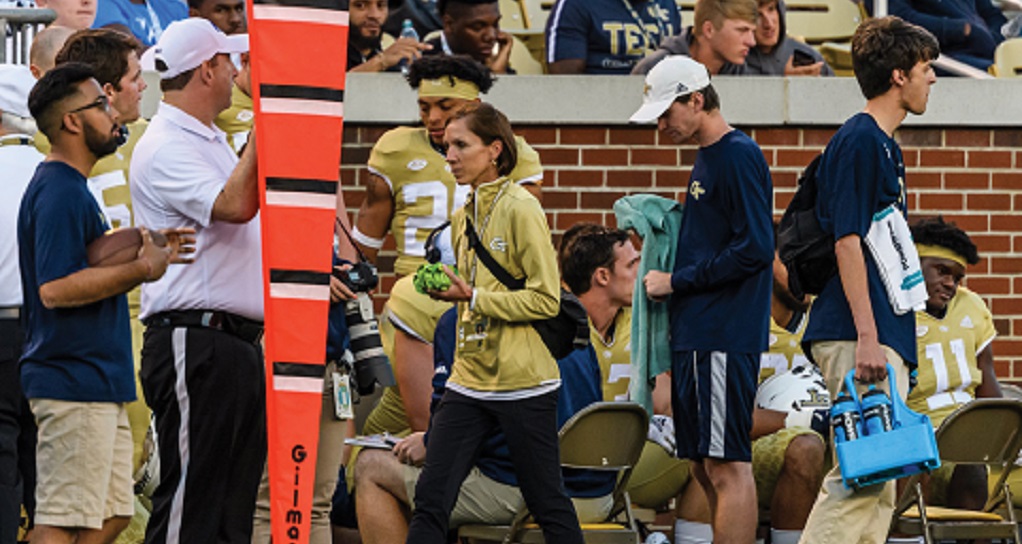Fueling Up For Peak Performance
By: Tony Rehagen | Categories: Alumni Interest

Today, Andy Ogletree, BA 20, is a professional golfer, touring the world and teeing off against the greatest players in the game. He owes a lot of the success to his coaches and teammates back at Georgia Tech. But when he's out on the loop and he goes to his bag for a bite of a protein bar or a sip of Powerade, he sometimes thinks of Associate Athletic Director Leah Thomas.
In 2016, Ogletree was a freshman sitting in a room with his fellow Tech golfers, waiting for a team meeting to begin. The squad was fresh off a disappointing result at a tournament that they were expected to win. They had been in the lead coming down to the last few holes but faded late and couldn't hold onto the win. Now, the players snapped to attention as then Tech sports dietitian Thomas entered the room and offered a suggestion on how they might improve their performance—by changing the way they snacked on the course.
Ogletree had spent days on fairways and greens since he was a kid without giving a second thought to what he ate or drank. “I was one of those guys who was so into what I was doing on the golf course that I'd forget to eat” says Ogletree. “[When Thomas spoke to us,] the entire team was super interested. None of us had considered our eating routines while playing."
By now, Thomas was used to her work being a revelation to athletes. When the Tech athletic department first brought her on board as director of nutrition in 2003, only about 10 schools nationwide had such a position devoted to athletics. Thomas didn't realize that sport nutrition wasn't a big thing when she got her bachelor's degree in nutrition and dietetics from the University of Tennessee at Chattanooga, where she ran track and cross country and was constantly mindful of what she put in her body and how it affected her performance. “It definitely sparked an interest in fueling correctly," says Thomas. “I knew what I wanted to do for my career."
After getting her master's in exercise physiology, Thomas came to Tech looking to make an impact wherever she could. She helped baseball and football players lose and put on weight in a healthy way. She helped tennis players and basketball players lose fat and gain body mass. She hoped that her work had a positive impact on performance, but also on health—both physical and mental. While the coaches and athletes were receptive across all sports, they were unfamiliar with the idea. “I understood, when I was a runner, it wasn't a huge topic either," says Thomas. “But a lot of athletes had an innate interest in eating right."
Then about 10 years ago, the culture shifted and suddenly everyone was talking about nutrition. Thomas believes the change coincided with the advent of pro teams and colleges incorporating analytics and sports science into their preparation.
 It made sense: If a player now believed that a technical understanding of physics and data could help them succeed on the field, why not nutritional science and hydration? Today, there's only one school in the entire ACC that doesn't have a dietitian, and most of them have entire staffs of scientists helping student-athletes watch what they eat.
It made sense: If a player now believed that a technical understanding of physics and data could help them succeed on the field, why not nutritional science and hydration? Today, there's only one school in the entire ACC that doesn't have a dietitian, and most of them have entire staffs of scientists helping student-athletes watch what they eat.
About five years ago, Thomas was starting to think about sports she hadn't worked much with during her tenure. “Golf isn't what comes immediately to mind when you think about fitness and conditioning," says Thomas. “But they were in the weight room like everyone else.”
Thomas was present at the 2016 tournament where the favored Yellow Jackets faded down the stretch. She came back to campus and dove into her research. She came up with a detailed, three-phase plan of snack attack on the 18-hole loop: For the first six holes, nibble on carbs and protein (a fruit bar, some nuts, or a lean-meat stick) for some quick fuel; for the next six, make more of a meal calorie-wise to lay an energy base (a protein bar or trail mix); and for the final six, just simple carbs (energy chews) to keep cognitive function sharp to close out the tournament and finish strong. Thomas also prescribed a certain amount of water or Powerade per hole, to stay hydrated. She even polled each player on their preferences and then pre-portioned each phase to put in their golf bags for each tournament.
“Every round, you're spending eight hours on the golf course; no matter when you play, you're missing a meal,” says Ogletree. “So, you replace those meals with snacks. I didn't have any idea the effect that was having on my body."
Thomas is reluctant to take even a small share of credit for a win or championship, much less a Tech athlete graduating to the pros. She just hopes that she was a part of the larger team effort and a positive influence on each student-athlete's life, on and off the field. Ogletree, meanwhile, is happy to brag for her. “She was very important to us," he says. “Coming down the stretch, you need that little bit of extra energy. In golf, every tournament comes down to the last few holes. If you save one shot at the end of the round, it's a big deal.”


